Doctor’s Office Sealed In Iran Because Of Hijab Dispute
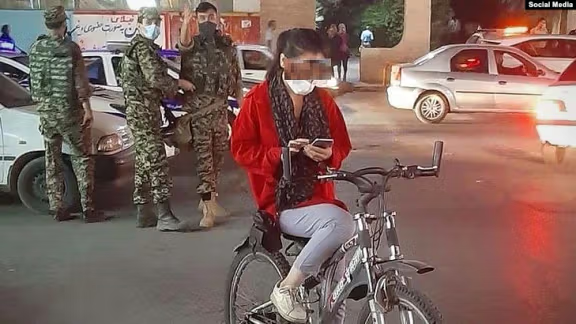
A medical office in the northeastern Iranian city of Kashmar has been sealed because the doctor objected to a woman harassing a patient over her “improper clothing”.

A medical office in the northeastern Iranian city of Kashmar has been sealed because the doctor objected to a woman harassing a patient over her “improper clothing”.
A video on social media shows that the doctor refuses to attend the pro-Hijab woman saying this is his private office and he cannot tolerate such moves.
Fars News Agency which is affiliated with the Revolutionary Guard reported Monday that the doctor has been summoned and indicted while his office has been sealed.
Despite nationwide protests in the past few months following the death of Mahsa Amini in the custody of the ‘morality police,’ the judicial and law enforcement agencies of the clerical regime continue to strictly follow the observance of the "mandatory hijab".
On January 16, the commander of the Bushehr police force in the south announced that several girls with “improper hijab” had been arrested on the charge of “assaulting a veiled lady”.
The arrest came after a video showed the girls quarrelling with a woman who was warning them about mandatory hijab in the street.
In the last few weeks, numerous reports have been published about police sealing off businesses, restaurants, cafes and even in some cases pharmacies for not observing the mandatory hijab rules by employees.
The Islamic Republic has increased pressure on women for non-compliance with the mandatory hijab in a situation that the country has been the scene of nationwide protests since September 16.
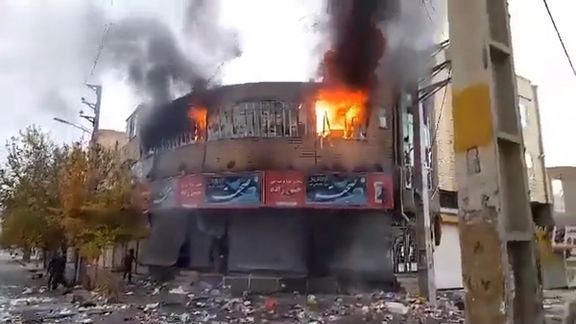
Recent protests in Iran were more widespread than in the past, an influential conservative has admitted, expressing surprise at the sharp international reaction.
Mohammad-Reza Bahonar, who is a leading figure among hardliners, in a television program contradicted what the Islamic Republic has tried to portray as limited protests since September.
Bahonar, who is also a member of the regime’s Discernment Council, said that the protests were “more widespread and deeper than demonstrations in the past five years, but he still used the word “riots” to characterize the popular movement.
The clerical regime has refused to recognize that the unrest triggered by the death in custody of a young woman in September was a genuine popular expression of dissatisfaction at the multiple crises Iran faces.
However, he admitted that “certain grievances and inefficiency in the economy, politics and even culture and diplomacy exist in the country.” On a few occasions in the past one year, Bahonar who was a deputy speaker of parliament, has asked for reforming governance in the Islamic Republic, even directly appealing to Supreme Leader Ali Khamenei in February 2022 to support “structural changes.”
Bahonar has a proven track record in organizing and mobilizing conservative groups. He did that following the landslide victory of Iran's reformists in the 1997 presidential election and the 2000 parliamentary elections and consolidated the conservative groups. Nonetheless, he had remained conspicuously silent on major political issues until Iran’s economic situation deteriorated and President Ebrahim Raisi’s first few months in office came as a shocking disappointment to many conservatives.
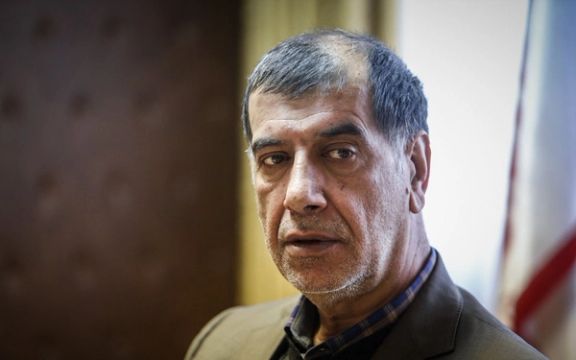
In his latest statement, he repeated his previous position that "We need a second Republic," meaning that a Constitutional Assembly should be formed to determine new boundaries for the government's authority and the people's rights.
On the face of it, this is not much different from what Mir-Hossein Mousavi, the reformist opposition figure under house arrest, said Saturday. In scathing criticism of the regime, Mousavi put forth three conditions: A free and untainted referendum about the necessity to change or write a new constitution. Second, in case of a positive vote by the people, to form a constitutional assembly composed of the “real representatives of the nation” through a free and fair election. Third, a second referendum to approve the draft constitution to establish a regime based on rule of law, in conformity with human rights and the will of the people.
Although Bahonar repeated the official line that “enemies” played a major role in instigating the protests, he called for wider political participation. He argued that conservatives' political rivals should not be barred from elections as it was the case in the parliamentary and presidential elections in 2020 and 2021. He also criticized the political system for weakening the country's political parties.
This runs counter to Khamenei’s policy of consolidating rule under hardliners, with a substantial number of parliament members representing the Revolutionary Guard at the expense of hundreds of other loyalists who were prevented from running in the elections.
Bahonar criticized the one-sided vote in 2020 and argued that it resulted in a low elections turnout and convinced foreign powers that the Islamic Republic has lost its legitimacy.
Referring to recent protests and noting that they have not come to an end, Bahonar said that after the protests recede, “we should not forget about the people's grievances and protests, although we tend to forget about their complaints as soon as the situation calms down."
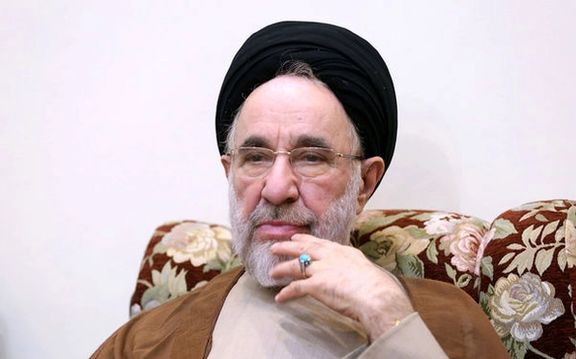
Iran’s former reformist President Mohammad Khatami on Sunday called on the government to meet the people's demands and prevent a revolutionary change.
Khatami issued a long statement, as a few other reformists also issued their statements just days before the 44th anniversary of the Islamic Republic on February 11.
During the past days several reformist, moderate and conservative politicians in Iran, including former president Hassan Rouhani, Expediency Council member Mohammad-Reza Bahonar, former deputy Interior Minister Mostafa Tajzadeh and former Prime Minister Mir Hossein Mousavi pointed out that the government needs to surrender to demands for reforms to save the country from havoc.
However, every one of these political figures put forth his own solution which mainly revolved around amending the Constitution or ensuring its full implementation.
It was only Mousavi who called for a brand-new Constitution based on a referendum and end to ‘reformism’ as a strategy for change, but he stopped short of saying how the current political establishment should be removed first.

Khatami who has never officially acknowledged his role as the leader of the ‘reformists’ accepted that "reforms have reached a deadlock." However, he still argued that another attempt to bring about change should pursue the path of reforms, without saying how the establishment would allow free elections or free speech.
Those opponents who demand a regime change have long argued that the Islamic Republic is not “reformable”, but politicians like Khatami who have remained loyal to the concept of an Islamic republic have never accepted that their 25-year efforts to bring about meaningful change have failed.
Jamshid Barzegar, a political analyst in Europe and a contributor to Iran International TV reacted in a series of tweets to Khatami’s statement, arguing that it is an attempt to help the regime rather than a serious plan for change. He contrasted the former president’s words with those of Mousavi and said that the latter has really parted ways with ‘reformism.’
The former president also warned that Iran is facing an all-out crisis which has its roots within the country. He further called for changes in the current constitution of the Islamic Republic to cope with the shortcomings that are visible everywhere.
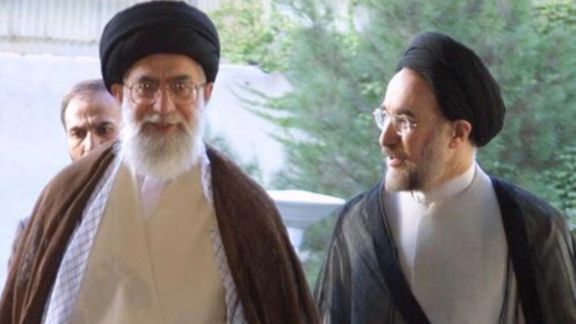
Others have pointed out that amending the constitution is not a solution if clerical rule is not abolished and complete freedoms are not granted.
Khatami also insisted that the general feeling in society is that the situation is bad, and Iran's enemies are taking advantage. At the same time, the government has been restricting civil liberties, he said. The result is a wide gap between the people and the government.
For the young protesters in Iran, using terms such as “enemies” would sound like repeating Khamenei’s slogans. They want to replace the Islamic Republic with a secular and democratic system, and do not believe that the United States, Europe or even Israel is an enemy.
Khatami warned that the collapse of the Islamic Republic will lead to chaos, civil war and bloodshed, an argument often used by the regime.
As his way out of the crisis he suggested strengthening national solidarity by giving a chance to all ideas, ethnic groups and religions to take part in the political dynamics through holding free and fair elections.
Khatami's third suggestion was declaring a general amnesty for all prisoners. Correcting the judicial process in Iran was his fourth suggestion. Freedom of news dissemination and supporting independent media and campaigning against all forms of corruption in the system were his fifth and sixth suggestions.
Khatami's next two suggestions were about leadership. He called for the accountability of all officials without mentioning Khamenei.
Preventing the military from intervening in political and economic affairs, changing the foreign policy, and putting an end to security organizations’ control over hiring and firing government employees were the other solutions Khatami suggested as a way out of the current crisis in Iran.
However, he did not propose a strategy or tactics to achieve these goals. It remains unclear if he would support protests or civil disobedience to force the government to relent. Short of that, many have expressed nice wishes for change, but Khamenei and his supporters have persisted in their ways of governance.
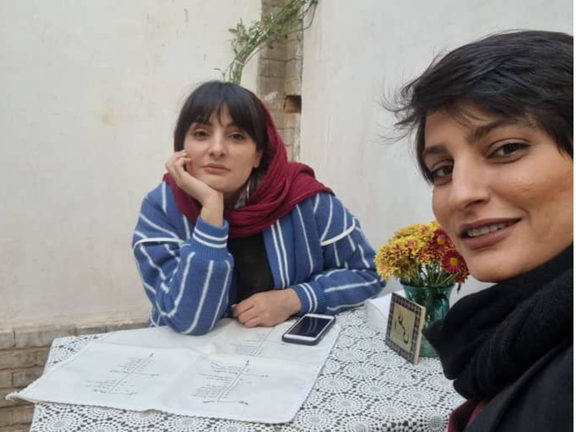
The Islamic Republic is still arresting journalists who reported the murder of Mahsa Amini, a young woman whose death in police custody sparked a nationwide protests.
Elnaz Mohammadi, the social service editor of Ham-Mihan newspaper has been arrested after being summoned to the notorious Evin prison in Tehran, reports from Tehran say.
Elnaz Mohammadi, is the twin sister of Elaheh Mohammadi, who was arrested on September 29 and is still behind bars.
Nilufar Hamedi and Elaheh Mohammadi are the two journalists who reported the death of Mahsa Amini and her funeral.
Earlier, Masoud Setayeshi, Spokesman for Judiciary had said the two detained journalists are accused of “conspiracy to commit a crime against national security and propaganda against the establishment” and their case is about to be finally decided.
Elnaz Mohammadi previously wrote on the fortieth day after Amini’s death that "No reporter attended the ceremony. When people arrived at the cemetery in Saqqez, Kordestan, no media representative was there except for those who were recording the event by their cell phones.”
The pressure on the journalists, who reported Amini’s death comes as the Islamic Republic has not yet responded to the complaint filed by her family.
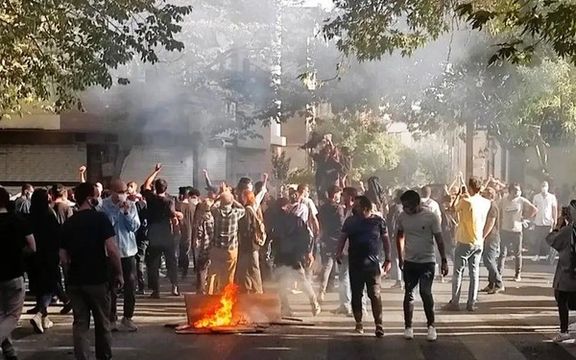
Iranian protesters chanted slogans on Saturday and held meetings with the released political prisoners, as some set fire to government street banners.
Videos received Saturday by Iran International show that people in Tehran, Shiraz, Bandar Abbas and Karaj chant "Death to the dictator" from their windows.
The destruction of banners and symbols of the Islamic Republic also continued on Saturday. A video sent from Karaj west of Tehran shows protestors set fire to images of Supreme Leader Ali Khamenei and the founder of the Islamic Republic Ruhollah Khomeini.
Protesters also paid homage to the people killed by regime forces by visiting their graves.
A group of teachers and activists visited Keyvan Samimi, a veteran journalist recently released from prison, and expressed their support for Farhad Meysami, a political prisoner who is in a dire physical condition due to his long hunger strike.
While many Iranians have been killed by regime agents, pictures of Ali Khamenei with young girls were released Saturday to present a kind image of him.
Masih Alinejad, a well-known Iranian journalist and activist, said that Iran’s dictator is seen brainwashing young girls. It reminds me of my childhood.
“This regime took us, women of Iran, hostage from the age of seven and wrote its own ideology on our bodies. The free world must take a strong action against this child abuse,” she wrote in a tweet.
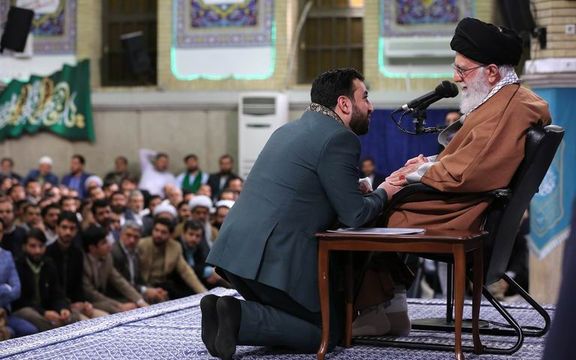
Iran’s Supreme Leader Ali Khamenei has agreed to pardon some prisoners and reduce sentences for those arrested during antigovernment protests in recent months.
Government media reported Sunday that Khamenei “agreed” with a proposal made by the country’s Judiciary to take what appears to be a political move to show clemency after hundreds were killed and around 19,000 arrested.
It is not clear from the announcement how many or which prisoners will be pardoned and whose sentences will be reduced. While thousands of young and teenage protesters were arrested in street demonstrations, hundreds of political activists, journalists and writers or artists have also been detained.
In a letter Judiciary chief Gholam-Hossein Mohseni Ejei sent to Khamenei young protesters are highlighted, with the caveat that they “were deceived by enemy propaganda,” and since then have expressed remorse.
Khamenei's move comes at the 44th anniversary of the Islamic Republic, as a move to rescue the image of the regime amid a grim economic crisis and mass public rejection of the political system he presides over. During five months of unrest, protesters unequivocally have been demanding regime change, not partial reforms.
Khamenei gave an early signal in the protests that government officials should label the protests as a foreign conspiracy. Since then, the protests are called “riots” and “enemies” are blamed for instigating the popular uprising. The term ‘enemy’ or ‘enemies’ refers to the United States and its allies.
Many protesters were forced under severe tortures to confess to acts that they did not commit, but they might have signed documents expressing regret. The move can be another tactic to force more dissidents to apologize and sign papers pledging to refrain from further antigovernment protests or even making critical comments.
Although Reuters reported that "tens-of-thousands" will be released, there is no such reference in the official print media. The agency probably quoted a claim made on state television.
Some of the conditions for being pardoned are mentioned in the announcement, including no record of spying for a foreign country, no connection with foreign intelligence services, not facing a charge of murder and no accusation of destroying public property.
However, if a person shared a simple video of protests on social media, the Islamic Republic’s intelligence and the Revolutionary Guard’s secret services easily label it as collaboration with a foreign enemy. There have been numerous cases of a simple social media message sent to someone abroad used against detainees as proof of espionage.
The Islamic Republic is facing a serious political deadlock, with its popularity at an all-time low around 15 percent according to recent polls and with over 8- percent of the population agreeing with regime change.
The regime is also facing serious international isolation particularly by Western countries, partly because of its violent and deadly repression, and also because of its move to supply kamikaze drones to Russia, which are being used against Ukraine.